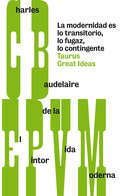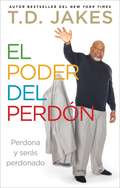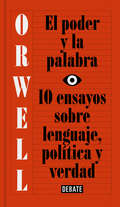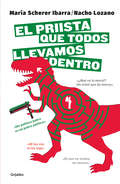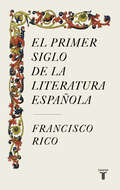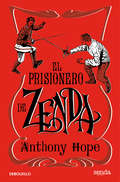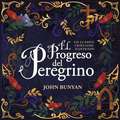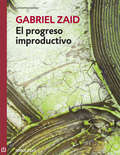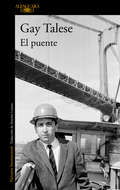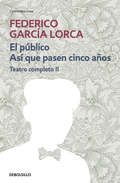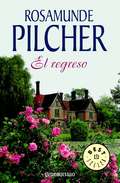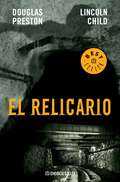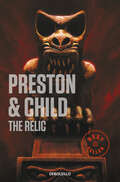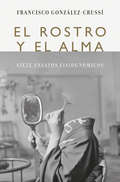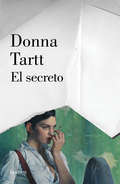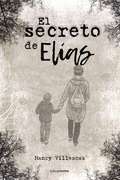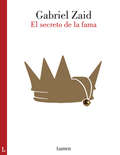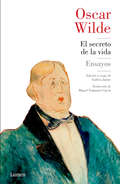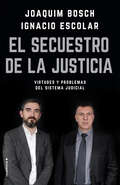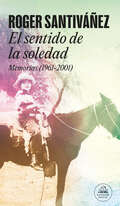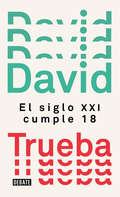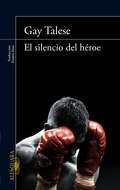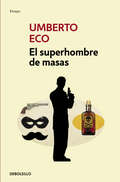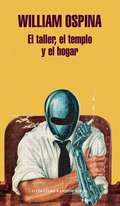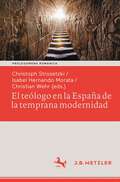- Table View
- List View
El pintor de la vida moderna (Serie Great Ideas #28)
by Charles BaudelaireIdeas que han cambiado el mundo A lo largo de la historia, algunos libros han cambiado el mundo. Han transformado la manera en que nos vemos a nosotros mismos y a los demás. Han inspirado el debate, la discordia, la guerra y la revolución. Han iluminado, indignado, provocado y consolado. Han enriquecido vidas, y también las han destruido. Taurus publica las obras de los grandes pensadores, pioneros, radicales y visionarios cuyas ideas sacudieron la civilización y nos impulsaron a ser quienes somos. Poeta, esteta y hedonista, Baudelaire fue además uno de los más revolucionarios críticos de arte de su época. Aquí profundiza en la belleza, la moda, el dandismo, el propósito del arte y el papel del artista, y describe al pintor que, en su opinión, expresa de un modo más pleno el drama de la vida moderna. Comentarios sobre la colección Great Ideas: «De veras que la edición es primorosa y pocas vecescontenido y continente pueden encontrarse mejor ensamblados y unidos. ¡Qué portadas! Para enmarcar. [...] Ante las Great Ideas, solo cabe quitarse el sombrero. ¡Chapeau!» ABC «Taurus propone un doble envite con este lanzamiento. Por un lado aumenta su compromiso con el ensayo; por otro, recupera el gusto por la estética. A los volúmenes se les ha proporcionado una portada delicada y cuidada (copian el original británico) que invita a la lectura.»La Razón «Un fenómeno editorial.»The Guardian «Aparte de los contenidos, en general muy bien elegidos, son tan bonitos que si los ven seguro que cae alguno.»El País «Ideas revolucionarias, crónicas de exploraciones, pensamientos radicales... vuelven a la vida en estas cuidadísimas ediciones, muy atractivas para nuevos lectores.»Mujer Hoy «Grandes ideas bien envueltas. De Cicerón a Darwin, esta colección entra por los ojos.»Rolling Stone «Original y bella iniciativa la emprendida por Taurus con su colección Great Ideas.»Cambio 16 «Hay libros inmortales, libros únicos que contienen pensamientos y reflexiones capaces de cambiar el mundo, tesoros en miniatura reagrupados en la colección Great ideas.»Diario de León
El poder del perdón
by T. D. JakesT.D. JAKES, autor de bestseller del New York Times, presenta El poder del perdón demostrando una vez más por qué lo llaman "un genio espiritual", "un maestro para entenderse con la humanidad" y uno de los mejores predicadores en los Estados Unidos. Jakes es consciente de que él y sus pares cristianos comparten verdades espirituales "que trascienden el tiempo y las culturas y reflejan un entendimiento universal de la naturaleza humana". En El poder del perdón explora la verdad espiritual del perdón y su importancia para aquellos que han sido objeto de agravios tanto como para quienes los han infligido. Este libro ofrece acciones claras y específicas para aplicar el perdón en la vida diaria. Jakes indica que las ofensas forman parte de la vida, pero si aprendemos a perdonar, los conflictos se pueden resolver y las relaciones pueden transformarse y salvarse. Jakes nos muestra que por grande o pequeña que sea la injusticia, el perdón nos permite liberarnos para tener un mañana mejor. practice forgiveness, he explains, we must first learn new styles of conflict resolution and new forms of anger management. To that end, he shows us how to recognize offenses when they come, establish boundaries, encourage purity of heart, develop trust, recover from hurts faster, and forgive ourselves for the rest of our lives. As unconditionally loved children of God, he attests, we are all forgiven. Through grace, we can forgive ourselves and the people around us. In this way, says Jakes, we can live a happier and more fulfilled life.
El poder y la palabra
by George OrwellEl poder y la palabra reúne diez ensayos de George Orwell que dan vuelta al concepto de verdad y al uso perverso del lenguaje político. «En una época de engaño universal, decir la verdad es un acto revolucionario.» Los ensayos políticos de George Orwell son una de las mejores fuentes de resistencia contra el uso corrupto del lenguaje y las versiones manipuladas de la realidad. Su pasión por la verdad y su esfuerzo infatigable por desmantelar las mentiras le convierten en una referencia inexcusable en estos atribulados tiempos.
El priista que todos llevamos dentro
by María Scherer Nacho LozanoCómico y trágico a la vez, El priista que llevamos dentro recuerda una sentencia que se ha tratado en más de un discurso, incluso por quienes niegan la cruz de su parroquia: ¿tenemos un priista interior?María Scherer Ibarra y Nacho Lozano, destacados periodistas de la fuente política, comparten en este libro una reflexión para todos los tiempos y el resultado de desenmascarar un rasgo que nos afecta a todos. Si la modernidad en México nació con el final de la Revolución , sería prudente pensar que heredamos algo de aquellos que nos formaron. Pero queda pendiente una pregunta después de toda una historia sin demasiados cambios: ¿tenemos una huella genética que se dejó alcanzar por una cultura priista? Una conclusión es segura: todo cabe en un priista sabiéndolo acomodar."¿Qué es la moral? Un árbol que da moras""Un político pobre es un pobre político""Ni los veo ni los oigo""El que no transa no avanza"
El primer siglo de la literatura española
by Francisco RicoLa literatura española medieval, expuesta por una de las voces con mayor autoridad en lengua y literatura españolas. Una obra fundamental en el campo de las humanidades. A lo largo de los siglos, el ser humano ha experimentado con las posibilidades estéticas y expresivas del lenguaje, y las ha puesto al servicio de la dimensión primordial de la vida cotidiana y la historia de los pueblos a través del arte de contar. En esta obra imprescindible, Francisco Rico indaga en diversos géneros medievales para comprender las raíces de la literatura española. Su historia no es unívoca ni lineal; formas como la canción trovadoresca, los cantares de gesta o la poesía didáctica florecieron a raíz del contacto directo con otras tradiciones. Nuestra literatura creció desde el principio enlazada a otras culturas. El primer siglo de la literatura española es un análisis exhaustivo del modo en que las actitudes primarias y universales del ser humano se reflejan en el desarrollo de nuestras letras y nos permiten entender sus orígenes más inciertos.
El prisionero de Zenda
by Anthony HopeEl prisionero de Zenda, el gran clásico de la novela de aventuras, en una cuidada edición especial con introducción de Arturo Pérez-Reverte. Rudolf Rassendyll es un joven y adinerado noble que vive apaciblemente en Inglaterra sin otra preocupación que su propio entretenimiento. Cuando decide viajar al reino de Ruritania para asistir a la coronación del rey Rudolf V, poco sospecha que se enfrentará a un reto mayor del que jamás hubiese podido soñar. El futuro monarca es secuestrado la víspera de la ceremonia por su hermano, el duque Michael, señor de Zenda y segundo en la línea de sucesión, y el joven Rassendyll, que guarda con Rudolf V un asombroso parecido, deberá ponerse en su piel para evitar que pierda el derecho al trono. De la noche a la mañana, se convertirá en el soberano de todo un país, en el prometido de la hermosa princesa Flavia y en la única persona capaz de devolver al legítimo rey su corona. Reseña:«Una aventura apasionante, un folletín a la antigua, en el mejor sentido del término, que no puede dejar de leerse con una sonrisa agradecida y cómplice.»Arturo Pérez-Reverte
El progreso del peregrino: Un clásico cristiano ilustrado
by John BunyanImpresionantes ilustraciones pintadas a mano y comentarios esclarecedores dan vida a esta obra maestra. Escrito desde la celda de la cárcel de Bunyan, El progreso del peregrino representa evocativamente una historia de lucha, perseverancia y fe. Con anotaciones y arte a través del libro, esta edición te invita a descubrir de nuevo la riqueza y los matices de este querido clásico.Originalmente escrito para el hombre común, el clásico cristiano de John Bunyan también ha encontrado su camino en las bibliotecas de académicos y universidades, una verdadera obra maestra para todos los tiempos. Su riqueza histórica, su simbolismo elocuente y su prosa deslumbrante han resistido la prueba del tiempo, y esta nueva edición ayuda a los lectores a apreciar la belleza perdurable que se encuentra en las palabras de Bunyan.Para los fanáticos desde hace mucho tiempo del cuento de Bunyan, o para aquellos que lo han encontrado por primera vez, esta edición ilustrada ofrece una nueva belleza y perspectiva. A los fanáticos del texto les encantarán las hermosas escenas pintadas a mano al comienzo de cada capítulo, y los lectores obtendrán una comprensión más profunda de la alegoría a partir de las anotaciones insertadas en cada capítulo de este cuento clásico.El progreso del peregrino ha inspirado a los lectores a través de los siglos a perseverar en su fe. Desde su publicación en 1678, este libro ha sido traducido a más de 200 idiomas. Es un best seller mundial, solo superado por la Biblia, y se ha convertido en un sello distintivo entre académicos y teólogos de todo el mundo. ¡Un elemento básico para cualquier biblioteca doméstica!
El progreso improductivo
by Gabriel ZaidA los ojos del autor nada es más urgente que superar la voluntad ciega del progreso per se. Este libro pone énfasis en el caso mexicano pero aborda un fenómeno característico de la globalidad. Ofrece una recomendación concreta: el saber, el poder y el dinero han de concentrarse en organismos piramidales que abandonen el espejismo del progreso. El cielo que nos tiene prometido el progreso, no acaba nunca de llegar. Una gran parte de la población vive en el limbo o en el purgatorio o el infierno: al margen de una vida mejor o descontenta de sus efectos contraproducentes. Ningún progreso parece hoy más urgente que la autocrítica del progreso. Este libro "merece ser leído y estudiado por todos". No sólo "ataca por igual los dogmas del neocapitalismo y los del (pseudo) socialismo". Propone "un modelo de desarrollo diferente", Octavio Paz Hace muchos años, Monterroso dijo que si "Borges escribiera en inglés, devoraríamos sus obras en malas traducciones. Esteparece ser el caso de El progreso improductivo. No es fácil aceptar una obra escrita por un mexicano en la tradición de Adam Smith, Gunnar Myrdal, Kenneth Galbraith y Robert Heilbroner; es decir, una obra bien escrita, que hace gala de imaginación, cultura y dominio de recursos literarios y, sobre todo, de su capacidad analítica". Adalberto García Rocha
El puente
by Gay TaleseEl Maestro del Periodismo narra una auténtica epopeya humana: la crónica de la construcción de un puente convertida en un nuevo clásico. «Talese cuenta historias cálidas, divertidas y trágicas sobre hombres, mujeres, acero y hormigón. Una buena lectura.»Denver Post «Llegan a la ciudad en coches enormes, viven en habitaciones amuebladas, beben whisky acompañado de chupitos de cerveza y persiguen a mujeres que no tardarán en olvidar. Se quedan poco tiempo, no más del que necesitan para construir el puente.» A finales de 1964 se completaron las obras del puente de Verrazano-Narrows, que une Brooklyn y Staten Island y que, medio siglo después, sigue considerándose un prodigio de la ingeniería: con sus 4.176 metros de longitud, es el puente colgante más largo de Estados Unidos y el sexto del mundo. Gay Talese, que siguió de cerca el levantamiento de este monumento al esfuerzo del hombre, recogió en El puente las historias humanas que se hallaban tras su construcción, desde el día a día de los obreros que trabajaban sobre vigas a alturas de vértigo hasta los acuerdos a puerta cerrada que desplazarían vecindarios enteros para dar cabida a la bestia. Un relato fascinante de intrigas políticas y de coraje, y una demostración del talento de Talese como cronista y narrador de historias. Reseñas:«Una crónica brillante. Describe con emoción a la gente que participó en el proyecto. Ve en el puente un logro humano más que mecánico, y aporta drama y aventura a la historia de su construcción.»The New York Times Book Review «Este libro tiene el encanto de I Cover the Waterfront, de Max Miller, y la precisión de Muerte en la tarde, de Hemingway.»St. Louis Post-Dispatch «Solo un escritor enamorado de su materia puede producir un relato tan fascinante. Hay muchas historias dentro de El puente, y todas merecen ser leídas.»Houston Post «Un relato maravilloso en el que combina tristeza, humor, peligro, muerte y angustia, y que al lector le resultará difícil dejar.»Arizona Republic «Un relato fascinante y atractivo. Un drama absorbente y maravillosamente escrito.»Times Union «Talese cuenta historias cálidas, divertidas y trágicas sobre hombres, mujeres, acero y hormigón. Una buena lectura.»Denver Post
El público | Así que pasen cien años (Teatro completo #2)
by Federico García LorcaEl público | Así que pasen cinco años es el quinto volumen de la Biblioteca Federico García Lorca y el segundo que reúne su «Teatro completo». En este libro se ofrecen al lector clásicos lorquianos como Amor de don Perlimplín, así como aquello que se dio en llamar el «teatro irrepresentable»: El público y Así que pasen cinco años. Asimismo, se incluyen conferencias y charlas dadas por el poeta alrededor de sus textos, lo que permite una aproximación aún más personal a su inmensa obra. La edición y los prólogos, a cargo de Miguel García-Posada, permiten al lector acercarse a la complejidad de su obra y disfrutar, a lo largo de los siete volúmenes que componen esta Biblioteca Federico García Lorca, de uno de los autores españoles más relevantes del siglo XX. Salvador Dalí dijo...«El sentido trágico de la vida que poesía Lorca se distinguía por la misma constante trágica por que se distingue el destino de todo el pueblo español.» --------------------------------------------------------------------------BIBLIOTECA FEDERICO GARCÍA LORCA Poesía competa:1. Libro de poemas | Primeras canciones | Canciones2. Romancero gitano | Poema del cante jondo3. Poeta en Nueva York | Sonetos Teatro completo:4. La zapatera prodigiosa | Mariana Pineda5. El público | Así que pasen cinco años6. Bodas de sangre | Yerma7. La casa de Bernarda Alba | Doña Rosita la soltera--------------------------------------------------------------------------
El regreso
by Rosamunde PilcherEstamos en 1935. Judith Dunbar, una chica de catorce años, es acogida por una familia muy especial que marcará significativamente su adolescencia. La suntuosa casa de campo que los Carey-Lewis poseen en Cornualles, idílica región del sudoeste de Inglaterra, se convierte en su segundo hogar. Sin embargo, turbada por el despertar de su propia sexualidad y tras una frustrante relación amorosa con Edward, el hijo mayor de la familia, Judith decide hacerse dueña de su propio destino.Lejos de allí, los vientos de guerra que se ciernen sobre Europa se desatan repentinamente. Judith está dispuesta a colaborar en la lucha contra el nazismo, lucha que le toca muy de cerca. Su padre cae prisionero de los japoneses, su madre desaparece. Edward es arrestado por los acontecimientos... La vida de Judith parece hundirse en un infierno de locura y barbarie. Pero en medio del caos, surgirá alguien que siempre ha estado a su lado, aunque ella no lo supiera.
El relicario
by Douglas Preston Lincoln ChildCuando la policía encuentra dos esqueletos unidos en un abrazo en un río de Manhattan, Margo Green, conservadora del Museo de Historia Natural, es invitada a colaborar en la investigación, no solo por sus conocimientos antropológicos sino por su experiencia el año anterior cuando se enfrentó con una horrenda bestia que andaba suelta por los sótanos del museo. Los esqueletos presentan señales de violencia y unas grotescas anormalidades que apuntan a una sola cosa: el despertar de una pesadilla dormida. Al misterio de los esqueletos se suma una serie de brutales crímenes. Con la ayuda de un teniente de policía, un enigmático agente del FBI y un eminente científico, Margo indaga el origen de los asesinatos. La investigación los llevará a un pavoroso laberinto de túneles, cloacas y galerías horadado bajo Manhattan, donde se revela por fin el verdadero secreto de la Bestia del Museo.
El relicario
by Douglas Preston Lincoln ChildEl extraño ídolo es enviado a Nueva York, donde queda arrumbado en los sótanos de un enorme y antiguo museo. Poco después, los científicos son masacrados por los indígenas y todo el proyecto cae en el olvido. Sin embargo, con ocasión de una importante exposición, las sinuosas galerías y los vetustos subsuelos del museo se convierten en escenario de varios asesinatos horrendos e inexplicables... Un mundo de maldiciones y pesadillas ancestrales instalado en el corazón del Nueva York actual. The Relic/I> ha sido adaptado al cine en una película del productor de Alien y del creador de los efectos especiales de Parque Jurásico.
El rostro y el alma
by Francisco González CrussíUn acercamiento, en siete ensayos, al rostro, esa parte del cuerpo humano que puede llegar a decir mucho de quiénes somos. El rostro y el alma ofrece un acercamiento a la fisonomía del rostro y el prejuicio que su forma puede generar. Francisco González-Crussí, uno de los médicos humanistas más reconocidos de nuestro tiempo, construye estos siete ensayos fisiognómicos: una obra única que une la curiosidad, la erudición, la amenidad y el sentido del humor para ofrecer un festín literario irrepetible. "Muchos pensarán que la fisiognomía y la frenología no son otra cosa que torpes esfuerzos por construir una ciencia... Pero yo creo vislumbrar algo más: un afán que no carece de nobleza: el tenaz proyecto de comprender el lenguaje del rostro. Porque los rostros hablan, aun sin tener voz. Es como si dijeran al observador: 'Déjame que te cuente un poco de mi persona y de mi propia historia: de dónde vengo; si me siento alegre y exultante, o triste y deprimido; y si estoy sano o me encuentro enfermo. Te hago saber que llevo en las mejillas la marca de un trauma que sufrí hace tiempo, o el rubor de mi vergüenza y mi natural timidez. Te señalo las trazas que una enfermedad me ha dejado. Y te cuento que, a pesar mío, porto en mi piel las cicatrices de los zarpazos de los años, o que, por el contrario, llevo conmigo el contento, el alborozo y la frescura de la juventud. Con todo y que eres un perfecto desconocido para mí, mi rostro tiene mucho que contarte; sólo te pido, por favor, no lo malinterpretes'." -Francisco González-Crussí- "González-Crussí es siempre sagaz y entretenido. Tiene una mente prodigiosa y sus libros son, sin temor a exagerar, pura sabiduría." -The New York Times-
El secreto
by Donna TarttLa tensión de la novela psicológica y el ritmo del thriller se dan cita en esta crónica de una juventud que le pide demasiado a la vida sin saber bien qué entregar a cambio. La vida no es fácil en un college de Nueva Inglaterra si eres un chico modesto y falto de afecto que llega de California, y Richard Papen lo sabe; por eso agradece que lo admitan en un pequeño grupo de cinco estudiantes capitaneados por un profesor de literatura clásica con mucho carisma y pocos escrúpulos. Los chicos sueltan comentarios en griego y se ríen de la ingenuidad y la torpeza de los demás, pero bien mirado se pasan el día bebiendo y engullendo pastillas. Hasta que un mal día lo que parecían chiquilladas adquieren una gravedad inesperada. Es entonces cuando Richard y su pandilla descubren qué difícil es vivir sin máscaras y qué fácil es matar sin remordimientos. El secreto, primera novela de la gran Donna Tartt, se cuenta entre las mejores obras del siglo XX. La crítica ha dicho...«El secreto es una auténtica maravilla... Una historia poderosa y planificada paso a paso.»The New York Times
El secreto de Elías
by Nancy VillescasUn secreto que no pudo guardar la enfermedad del olvido. Es la historia de un secreto en medio de la guerra y de la enfermedad del olvido. Es de Elías, pero también de Martina. <P><P>La violencia de un país se va asomando por cada rincón de la narración y grita de dolor. Un dolor familiar. <P><P>Un dolor personal. Elías empieza un recorrido en busca de su pasado, que no es solo el suyo, también pertenece a cada persona de su hostil entorno, Ricardo, Rogelio, Melisa y Lucila. <P><P>Su búsqueda, en medio de la insensatez, le desvelará un secreto del que muchos tendrán que dar cuenta.
El secreto de la fama
by Gabriel ZaidCompilación de 18 ensayos sobre el artista y la fama, publicados anteriormente en revistas culturales. Recomiendo vivamente al lector las estimulantes reflexiones del poeta y ensayista mexicano Gabriel Zaid, autor de obras que he leído siempre con interés. La noción de fama va ligada a la de visibilidad creada por la industria cinematográfica y televisiva, y potenciada por internet. La ubicuidad de la imagen cubre y suplanta el valor de la obra que representa. Lo que cuenta no es ésta sino el autor, y ¿qué es el autor sino la imagen cuidadosamente retocada con maquillaje en el plató televisivo o la postura ensimismada del fotógrafo de servicio, difundida en la prensa o por la propaganda del editor? Hoy día es casi imposible publicar algo sin la foto logotipo. Basta hojear las páginas de cualquier suplemento cultural de los periódicos más conocidos del mundo para topar con el reclamo de un autor cuya mirada trascendente o pose rodinescopensativa trata de transmitir al lector la presunta intensidad de lo escrito. Juan Goytisolo.
El secreto de la vida: Ensayos
by Oscar WildeEl corpus ensayístico del gran Oscar Wilde, por primera vez en un solo volumen. Además de dramaturgo, poeta y narrador, el mítico Oscar Wilde fue un excelente ensayista, dueño de una vasta cultura, un gusto exquisito y una honda sensibilidad. Este volumen recoge una amplia selección, ordenada cronológicamente, de sus mejores ensayos, un género que el autor subvirtió y enriqueció con recursos propios del teatro y la novela. A lo largo de estos espléndidos textos, Wilde indaga en sus obsesiones estéticas, desde los años de su juventud que lo mostraban ya como agudo observador, hasta su trágico final, resumido en el estremecedor De profundis. Los pintores prerrafaelitas, los sonetos de Shakespeare, la idea del arte por el arte, el ocio, la naturaleza, la necesidad de la crítica, la amistad o la pasión por Grecia son algunos de los asuntos que vertebran este libro, verdadera esencia de la obra de Oscar Wilde y del movimiento estético finisecular, uno de los últimos y más vibrantes cantos a la belleza que dio la cultura occidental. Reseña:«El pensamiento y el lenguaje son para el artista instrumentos de un arte.»Oscar Wilde
El secuestro de la justicia: Virtudes y problemas del sistema judicial
by Ignacio Escolar Joaquim Bosch Grau¿Está la justicia española secuestrada por los políticos? Joaquim Bosch (ex portavoz de Juezas y Jueces para la Democracia) e Ignacio Escolar (director de eldiario.es) han unido fuerzas para escribir un libro necesario, incisivo y pedagógico sobre la Justicia. El sistema judicial está en crisis. Así lo denuncia esta reflexión crítica sobre un deterioro que afecta profundamente a nuestra democracia. En una escalada sin precedentes, las injerencias políticas son muy visibles, se concentran en la cúpula judicial y son especialmente peligrosas en los casos de corrupción. Por otro lado, la ciudadanía percibe que las leyes no siempre son iguales para todos. Las maniobras que tratan de capturar las instituciones judiciales están relacionadas con un fenómeno más amplio: los intentos de secuestro de la Justicia como valor. Por eso los autores también estudian: las injusticias que padecen las víctimas de violencia machista, y los que padecen abusos bancarios; los problemas en la aplicación de la prisión provisional o los excesos en los límites de la política de penas de privación de libertad; el drama de los refugiados y la criminalización de los inmigrantes; la falta de reparación de las víctimas del franquismo; la actuación de la justicia en el conflicto catalán; y los crecientes recortes de libertades. Pero El secuestro de la Justicia es también una defensa de la magnífica base del sistema judicial, esa inmensa mayoría de magistrados que no se ha dejado contaminar. Como los que llevaron los abusos bancarios a la jurisdicción europea y vencieron. O los que, sin medios suficientes, investigan la corrupción y ponen contra las cuerdas a políticos y a empresarios. La crítica ha dicho...«Relato pedagógico sobre separación de poderes.»EFE «Un texto ensayístico, pero escrito con estilo periodístico, orientado a plantear una larga serie de reflexiones y dudas sobre el llamado tercer poder.»Juan Bolea, El Periódico de Aragón «Un libro fundamentalpara entender nuestro país. No solo recomendable, sino imprescindible.»Carlos Ávila, Andamios (y la vida sigue)
El sentido de la soledad: Memorias (1961-2001)
by Roger Santiváñez"El asunto era muy sencillo: mi siguiente paso era la tumba. Y no: yo quería escribir, seguir escribiendo y, obviamente, para escribir debía mantenerme vivo".
El siglo XXI cumple 18
by David TruebaUna reveladora recopilación de artículos con la que David Trueba pasa revista a los primeros dieciocho años de nuestro siglo. «Hay cosas que pasan y que de tanto pasar terminan por definir los tiempos mucho mejor que las teorías.» Con estas palabras, el novelista, cineasta y periodista David Trueba sintetiza el cometido de esta recopilación de artículos periodísticos. Los artículos se centran en hechos, no en opiniones, y analizan los verdaderos significantes de nuestro tiempo. Porque cuando el siglo XXI llega a la mayoría de edad, ya no se trata de analizar los cambios y escuchar los latidos renovadores: nos encontramos ante algo ya impuesto, ante una nueva manera de ser. De entre los sucesos que marcan estos dieciocho años de vida de nuestro siglo, Trueba destaca la emigración y su impacto en los miedos colectivos; la identidad tanto sexual e íntima como nacional y colectiva; la crisis de la democracia y sus representaciones cotidianas, reducidas a lo electoral y sus alternancias; y, finalmente, la transformación tecnológica con el consiguiente impacto en el empleo y la economía de a pie. El siglo XXI cumple 18 se convierte así en una revisión de algunos de los asuntos de la actualidad que más nos perturban y que, nos guste o no, están aquí para quedarse.
El silencio del héroe
by Gay TaleseEl mejor Talese en un libro evocador e íntimo, con personajes memorables: una lección de literatura y periodismo. Desde sus primeros años de reportero, en el periódico de su instituto o en la universidad, pasando por su trabajo como periodista deportivo en The New York Times y sus artículos para Esquire o para The New Yorker, Talese se ha destacado por encontrar historias detrás de cada noticia y por el retrato implacable de los «héroes silenciosos». La semblanza de Joe Louis, Floyd Patterson y Muhammad Ali visitando a Fidel Castro en La Habana; la de Joe DiMaggio, el gran campeón aislado en su retiro, o su propio periplo hasta China para seguirle la pista a la jugadora de fútbol que habría podido darle el Campeonato del Mundo a su país, son algunas de las deslumbrantes crónicas recogidas en esta edición, junto a un texto reciente sobre Joe Girardi, «el mánager de la crisis». Reseñas:«Brillante ejemplo de una época en que el periodismo era una forma de arte y Talese su Miguel Ángel. Merece ser leído una y otra vez.»Publishers Weekly «El material humano que acopia Talese no tiene desperdicio porque se solapa con la vida misma, el mejor nutriente de la ficción literaria. Sus reportajes parecen retazos sacados de una novela: la gran novela del mundo contemporáneo.»Francisco Calvo Serraller, El País «Como pone de manifiesto esta joya antológica, Talese transforma la prosa deportiva en profundas y deliciosas piezas literarias.»The New York Times «Los reportajes de Talese nos recuerdan la esencia de un oficio en vías de extinción.»Sergi Pàmies, La Vanguardia «La suya es una manera de ver el periodismo como algo más que información empaquetada, de dignificar el oficio convirtiendo cada información en una historia escrita con toda la artillería de un escritor. Mientras Talese siga en la brecha, el gran periodismo no morirá.»Antonio G. Iturbe, Qué Leer «Un autor imprescindible... Un escritor clave de nuestro tiempo.»Santiago Segurola, El Mundo «Talese es un reportero maravilloso.»Mario Puzo «Un clásico moderno.»Carles Geli, Babelia «Es como si Homero lo invitara a uno a tomarse un Martini en un cómodo bar y luego le dijera: -Déjame contarte sobre mi vida, pero primero empecemos con Aquiles-... Un texto excelente y delicioso de leer... Detrás de los elegantes e impecables trajes a medida de Talese hay un corazón voraz de esponja, que absorbe el mundo y luego lo va exprimiendo a cuentagotas con el paso de los años.»The Washington Post
El superhombre de masas: Retórica E Ideología En La Novela Popular (Ensayo Ser. #Vol. 237)
by Umberto EcoUn análisis exhaustivo de los personajes que aparecen en las novelas. «Creo que se puede afirmar que la pretendida superhumanidad de Nietzsche tiene por origen y modelo doctrinal no a Zaratustra, sino al conde de Montecristo de Dumas.» Eco parte de esta afirmación de Gramsci para estudiar a los superhombres de las novelas populares, de Rocambole a Montecristo, de Arsène Lupin a James Bond, de Tarzán a Superman, sin olvidar a Rodolphe de Gerolstein, el príncipe de Los misterios de París. ¿Por qué y cómo se leen las novelas folletinescas? ¿Qué mecanismos entran en juego en su estructura narrativa? ¿Cómo funciona la ideología de la consolación (el héroe consuela al lector de no ser un superhombre)? Estas son algunas de las preguntas que se plantea Umberto Eco en esta recopilación de ensayos magistrales. La crítica ha dicho... «No es solo un punto de referencia imprescindible a la hora de enfrentarse al vasto mundode la literatura popular, es también una delicia por su chispeante estilo.»Joaquín Marco, ABC «Uno de los pensadores más influyentes de nuestro tiempo.»Los Angeles Times
El taller, el templo y el hogar
by William OspinaUna colección de agudos ensayos de William Ospina sobre la crítica situación a la que ha llegado la humanidad. En estos nueve ensayos, William Ospina reflexiona sobre la situación en la que está un capitalismo salvaje que ha desacralizado la naturaleza y el trato entre los hombres, y que tiene al planeta al borde de su colapso natural y a la humanidad en la desigualdad, la rudeza, la soledad, el sinsentido# Ospina busca los orígenes de semejante precipicio, lo describe, lo deplora, pero al tiempo propone soluciones, muestra el camino hacia una recuperación de los valores perdidos y resalta la importancia o, mejor, la urgencia de hacerlo. Echando mano de la historia, de la literatura, de momentos reveladores de la poesía, de las mitologías y las religiones, así como de sus experiencias personales, Ospina invita a una mirada paciente y crítica sobre nuestro mundo, una agudeza que es, a la vez, de una calidad estética que suele atribuirse solamente a las obras de ficción. "Pero no es por salvar las reliquias del pasado, de las edades heroicas y de los bellos sueños de una humanidad más lenta y más sencilla por lo que hay que resistir y buscar el renacimiento de lo sagrado: es porque en el vértigo de este remolino de desmemoria y de escombros, cada vez parece más cercano el colapso. Y si bien el planeta podría persistir sin nosotros, girando con su cementerio de hazañas, de inventos y de cosas bellas en las tinieblas de la noche cósmica, algo en nosotros se resiste a aceptar que renunciáramos a tanto por tan poco, y que habiendo tenido en nuestras manos el mundo generoso de Whitman y de Shakespeare, nos hayamos resignado al mundo mezquino de la vida sin sueños y de la muerte a plazos". El autor
El teólogo en la España de la temprana modernidad: Formas de vida seculares y espirituales. Impacto político, social y estético (Prolegomena Romanica. Beiträge zu den romanischen Kulturen und Literaturen)
by Christoph Strosetzki Isabel Hernando Morata Christian WehrEste volumen analiza el lugar y el perfil del teólogo en el Siglo de Oro español. Los capítulos que lo integran se centran no solo en los miembros del clero católico, sino también en los seguidores de corrientes religiosas como el recogimiento, el dejamiento, el alumbradismo y la devotio moderna. La figura del teólogo se aborda desde las perspectivas de los estudios literarios y culturales, la teología y la filosofía. Son objeto de atención la concepción que el teólogo tenía de sí mismo, su actitud, conocimiento, formación, influencias y actividades, que atestiguan los tratados, los textos ficcionales y la literatura religiosa del Siglo de Oro. Se plantean cuestiones como las consecuencias de la Reforma y la Contrarreforma en la imagen de los teólogos, sus relaciones familiares y económicas con otros miembros de la sociedad, y el importante papel que alcanzaron en este período como autores literarios.Dieser Sammelband analysiert den gesellschaftlichen Ort und das Profil des Theologen im Siglo de Oro, wobei auch Vertreter religiöser Lehren, die nicht dem katholischen Klerus angehörten, also Repräsentanten der Strömungen des recogimiento, dejamiento, alumbradismo oder der devotio moderna Berücksichtigung finden. Es kommen die Perspektiven vor allem von Literatur- und Kulturwissenschaft, Theologie und Philosophie zu Wort. Analysiert werden Selbstverständnis, Haltung, Wissen und Ausbildung, Einflussbereich und Tätigkeitsfeld der Theologen, wie sie in Traktaten, fiktionalen Texten und religiöser Literatur bezeugt werden. Dabei werden Fragenkomplexe diskutiert wie z.B. die nach den Folgen von Reformation und Gegenreformation für das Selbstverständnis des Theologen, nach den familiären und wirtschaftlichen Bindungen der Theologen oder nach der bedeutenden Rolle von Theologen als Autoren in der Literatur der Zeit.
